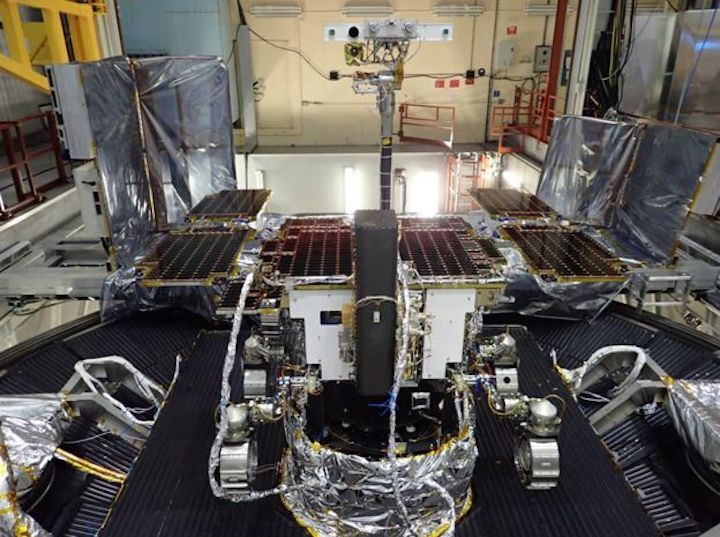MOSCOW, July 12. /TASS/. Russian state-run space corporation Roscosmos has not yet been officially notified by the European Space Agency (ESA) about the latter’s full withdrawal from the ExoMars-2022 mission, but can still implement the Russian part of the project on its own, the Roscosmos press service has told TASS on Tuesday.
"The Russian side has not yet received an official ESA notification about its full withdrawal from the ExoMars-2022 project, that is why we can only react to their ‘Twitter diplomacy’ at the moment," the corporation said.
The Russian space agency expressed its regret over the fact that Europe prioritized ambitions of certain officials and countries over a joint quest to find traces of life on Mars.
"Russia can still implement its own part of the ExoMars project on a national level or with partners from friendly countries," the corporation said.
ESA withdrawal
Earlier on Tuesday, ESA’s Director General Josef Aschbacher said the Council of Ministers of the European Space Agency decided to terminate cooperation with Roscosmos on the ExoMars mission.
"Today ESA Council addressed the ExoMars Rover and Surface Platform mission, acknowledging that the circumstances which led to the suspension of the cooperation with Roscosmos <…> continue to prevail," he said on Twitter, referring to the conflict in Ukraine and the sanctions on Russia. "As a consequence, Council mandated me to officially terminate the currently suspended cooperation with Roscosmos on the ExoMars Rover and Surface Platform mission."
"New insights on the way forward with other partners will come at a media briefing on 20 July, details to come," the official said.
Roscosmos Director General Dmitry Rogozin told TASS in July that the Russian state-run space corporation had resumed negotiations with the ESA about the ExoMars mission, with launch possible no earlier than in 2024. In his words, the equipment and Kazachok landing platform for the mission have the potential for launch in 2024. Launch windows for a mission to Mars are available once in two years. Therefore, it will be impossible to send a mission in 2023.
About ExoMars
The ExoMars mission was designed to deliver the Russian landing platform to Mars for placing the European rover onto the Red Planet’s surface. After disembarking the rover, the platform was to begin to work as a longtime autonomous research station for studying the composition and properties of Martian surface and atmosphere.
The first stage of the ExoMars project was launched in 2016 and the mission included the TGO (Trace Gas Orbiter) apparatus and the Schiaparelli demonstrator landing module, which reached the Red Planet in October 2016.
The start of the second half of the ExoMars mission was scheduled for 2018, however, it was postponed to 2020 and 2022. The Proton-M launch vehicle with the Briz-M upper stage were planned to be used for the launch from the Baikonur Cosmodrome.
Quelle: TASS

